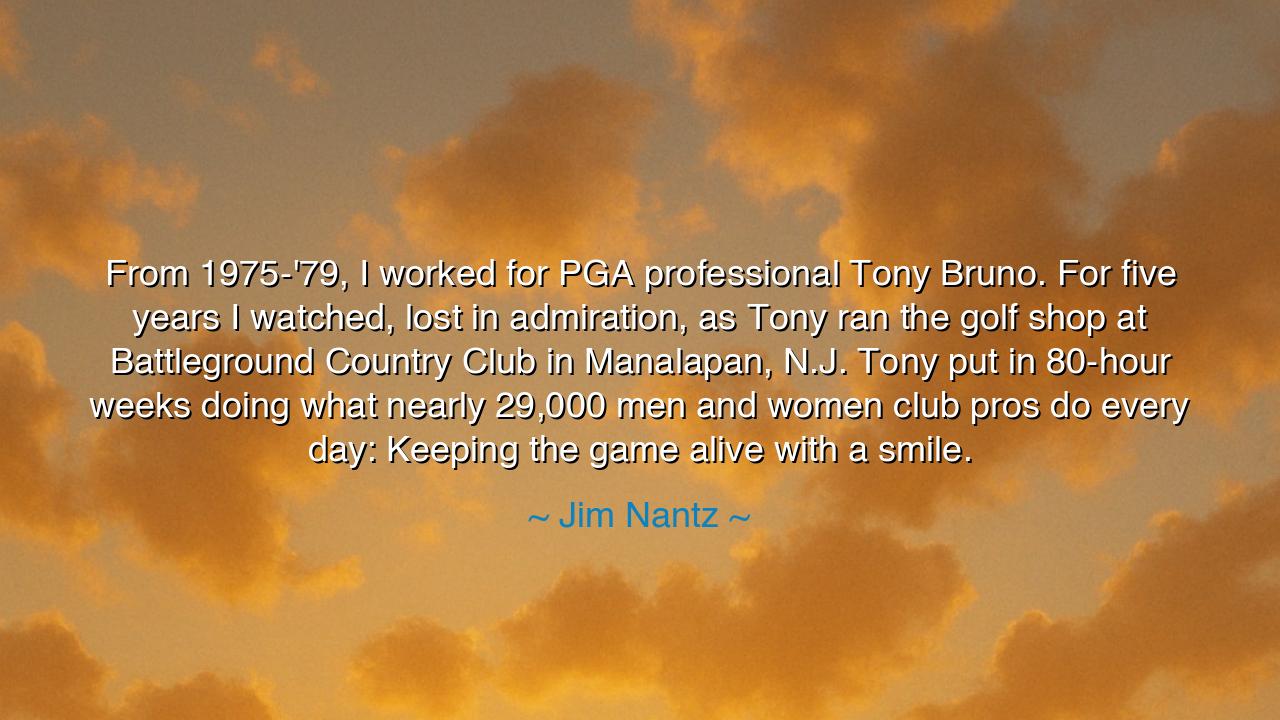
From 1975-'79, I worked for PGA professional Tony Bruno. For five
From 1975-'79, I worked for PGA professional Tony Bruno. For five years I watched, lost in admiration, as Tony ran the golf shop at Battleground Country Club in Manalapan, N.J. Tony put in 80-hour weeks doing what nearly 29,000 men and women club pros do every day: Keeping the game alive with a smile.






Hear the reverent words of Jim Nantz, whose voice has long carried the spirit of sport: “From 1975–’79, I worked for PGA professional Tony Bruno. For five years I watched, lost in admiration, as Tony ran the golf shop at Battleground Country Club in Manalapan, N.J. Tony put in 80-hour weeks doing what nearly 29,000 men and women club pros do every day: Keeping the game alive with a smile.” These words, born from memory and gratitude, are not merely about golf, nor about one man alone—they are about devotion, perseverance, and the unseen labor that sustains great traditions.
The origin of this truth lies in the world of golf, where champions may shine under the bright sun of television, but behind them stands an army of faithful laborers—professionals who never win tournaments yet keep the game alive with a smile. Nantz speaks of Tony Bruno not as a celebrity, but as a craftsman of dignity. For day after day, hour after hour, Tony worked quietly, ensuring that others could enjoy the beauty of the game. His story reminds us that true greatness often dwells not in those who are celebrated, but in those who serve without applause.
This wisdom is as old as civilization itself. Recall the builders of cathedrals in medieval Europe. Their names are mostly forgotten, yet their hands raised the stone arches that still inspire awe centuries later. They worked not for fame but for faith, laying one stone atop another until heaven itself seemed to descend into their sacred halls. Like Tony Bruno in his golf shop, they were the hidden keepers of beauty, the ones who labored with smiles so that others could glimpse something eternal.
Nantz’s admiration speaks to a deeper truth: that the measure of a life well lived is not only in victories but in dedication. To work eighty hours a week for years, not for wealth or renown, but for the simple joy of service—that is a heroism overlooked by the world, but precious to the soul. It is the same spirit that moved Florence Nightingale, who worked tirelessly in field hospitals, unseen, uncelebrated, yet whose persistence saved countless lives. In every age, there are those whose quiet endurance sustains the fabric of society.
The meaning of Nantz’s words is also this: gratitude must be given to those who stand behind the scenes. When we see the gleam of a golf course, the joy of a tournament, or the grace of a player’s swing, we must remember the countless hours of unseen toil that make such moments possible. Tony Bruno, and the 29,000 others like him, remind us that beauty and excellence are rarely the work of one, but the shared effort of many, held together by smiles, patience, and resolve.
The lesson is plain and powerful: honor the unseen laborers in your own life. In your family, in your workplace, in your community, who are the ones who keep everything alive with a smile? The teacher who stays late into the night grading papers, the janitor who ensures every hall is clean, the parent who sacrifices sleep for their child’s comfort—these are the Tonys of our world. Their names may not be etched in record books, but their impact is eternal.
Practical action must follow: cultivate gratitude. When you benefit from someone’s hidden labor, acknowledge it. Offer thanks to the cashier, the nurse, the coach, the driver. See the humanity in those who serve tirelessly. And in your own labor, take pride not only in grand achievements, but in the steady, humble acts that keep life moving forward. For even if the world does not watch, you too are keeping the great game of life alive.
Thus the teaching is sealed: greatness is often quiet, but it endures. A smile in service is worth more than a trophy, and dedication given day after day outshines the fleeting applause of fame. Jim Nantz remembered Tony Bruno not because he won championships, but because he embodied the nobility of service. So let us remember the same in our lives—and strive to live not only for glory, but for the joy of keeping the game alive, with a smile.






AAdministratorAdministrator
Welcome, honored guests. Please leave a comment, we will respond soon